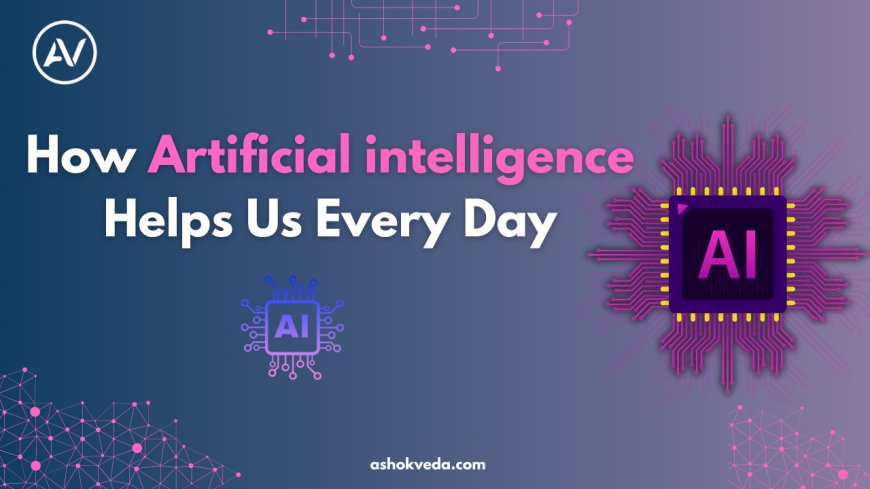Why We Need Artificial Intelligence in Everyday Life
Discover AI, everyday applications, benefits, automation, smart devices, efficiency, technology, innovation, solutions, impact, and future trends.

Artificial intelligence technology is becoming more common and essential today. This is mostly because artificial intelligence has been incorporated into several areas of our presence.Understanding why we need artificial intelligence in everyday life improves individual productivity, advances healthcare, transforms communication, and supports many other fields is necessary for understanding why we need it in daily life. Certainly, the subject of why we need artificial intelligence in everyday life impacts each and every one of us.
Artificial intelligence is becoming an important part of everyday life and is no longer just an idea found in science books. Understanding artificial intelligence's advantages in a variety of situations can help us understand why we need it in daily life. Among the major technologies supporting this change are machine learning, ChatGPT, data science, AI technique, and Python. In addition to automating work, these technologies improve decision-making, customize experiences, and much more. These technologies can be incorporated into many different kinds of industries, which will greatly increase productivity and standard of living. In order to navigate a technologically driven future, it is important that we understand why we need artificial intelligence everyday life .
Importance and benefits of why we need Artificial Intelligence in Everyday Life
1.Increasing Personal Productivity
-
Automation of Routine Tasks: By keeping track of appointments, sending out reminders, and delivering information fast and precisely, virtual assistants free up time for deeper and creative work.
-
Increased Accuracy: AI-powered solutions increase precision and stability by reducing human mistakes in repeated steps.
People can focus on more strategic and creative tasks by automating repeated tasks, which increases productivity and performance overall.
2.Improving Medical Care
-
Medical Data Analysis: Large-scale data is analyzed by AI systems, which produce exact diagnoses and customized treatment regimens.
-
Early Detection: Machine learning algorithms use patterns found in medical pictures to identify problems early on, leading to better patient outcomes and lower costs for healthcare.
Better treatment for patients and more effective healthcare systems result from the increased skills of healthcare workers brought forth by artificial intelligence.
3.Changing Communication
-
Advanced Natural Language Processing: ChatGPT and similar systems understand and generate text that is similar to that of a human, allowing simpler and natural interactions with machines.
-
Enhanced client Service: Companies use AI-driven solutions to provide rapid responses and high user happiness, which enhances client loyalty and experiences.
These developments ensure that organizations can properly and quickly deal with client requests by improving communication.
4.Data-Informed Decision Making
-
Trends and Information: Artificial intelligence (AI) systems examine huge amounts of data to find patterns that inform strategic choices, assisting companies in remaining adaptable and successful in the marketplace.
-
Python for Development: Python's powerful libraries and simplicity make it a popular choice for building AI models, which speeds up the adoption of these data-driven solutions.
Data-driven decision-making promotes growth and innovation by enabling more precise and strategic company operations.
5.Individualized Experiences
-
Content Suggestions: Personalized suggestions are provided by media streaming services and online retailers through machine learning algorithms, which increase customer engagement and pleasure.
-
User Satisfaction: AI approaches allow systems to learn from individual user preferences and behavior, resulting in experiences that are personalized to fit their demands.
By improving the user experience, personalization makes technological interactions more interesting and relevant.
6.Improving Education
-
Intelligent tutoring systems: Offer individualized instruction that adjusts to each student's learning style and speed to improve understanding and storage of the subject matter.
-
Python in Education: To create flexible tools that facilitate the development of more effective and accessible adaptive learning platforms.
With the help of artificial intelligence, students can receive individualized instruction and progress at their own rate.
7.Increasing Automation at Home
-
Smart devices: Increase convenience and energy efficiency by automating processes like lighting control, temperature adjustment, and security system management.
-
Utilizing Machine Learning in Optimization: To maximize device performance and offer a flawless user experience, analyze data.
Because home automation makes daily tasks easier and effective, it enhances quality of life.
8.Optimizing Transportation
-
Automated Vehicles: Artificial Intelligence and machine learning approaches enhance safety and efficiency, minimizing collisions and trip duration.
-
Traffic management: AI uses traffic patterns to optimize routes and lessen traffic, making trips faster and more comfortable.
Transportation is now safer, more effective, and less harmful to the environment thanks to these innovations.
9.Support of Environmental Sustainability
-
Climate Change Predictions: Machine learning models help combat climate change by anticipating effects and optimizing energy use.
-
Sustainability through Data Science: Examines environmental data to create sustainable practices and guide policy choices.
Artificial intelligence aids in sustainability initiatives by reducing environmental effects and facilitating more efficient resource management.
By looking at the many uses and advantages of artificial intelligence, we can address the issue of why we need it in daily life. Artificial intelligence is present in our daily lives, changing everything from communication to healthcare and personal productivity to environmental sustainability and assistance. These developments are fueled by machine learning, ChatGPT, data science, AI methods, and Python. We can continue to increase productivity, make wise judgments, and improve our quality of life by embracing these technologies.
We have explored why we need artificial intelligence in everyday life, showing its application in a number of industries and how it affects our daily lives. It has been discussed how to integrate AI approaches, how to utilize Python to construct AI models, how
Important data science is decision-making, how ChatGPT may facilitate conversations, and how powerful machine learning is. Together, these innovations show how crucial artificial intelligence is to making improvements to our daily lives.
The further advancement and common application of artificial intelligence will keep incorporating AI into our everyday life as time goes on. Understanding why we need artificial intelligence in everyday life We can better appreciate the technology that powers artificial intelligence and their potential to change the world if we understand why we need it in daily life. With the right recognition and use of artificial intelligence, we may anticipate a time when technology improves every facet of our life.




































